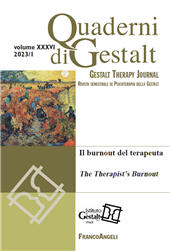Il burnout del terapeuta : formazione, politiche professionali e ricerca come strumenti di prevenzione
11-27 p.
L'obiettivo di questo articolo è quello di aprire una riflessione su quali competenze sono necessarie per poter stare vicino, a livello professionale, alla sofferenza umana. La condizione esistenziale e sociale delle persone oggi appare sempre più traumatica, così da richiedere mag-giori abilità cliniche ed emotive agli operatori della salute mentale, esposti ad un elevato rischio di burnout. La curatrice dell'articolo, in collaborazione con i colleghi del comitato editoriale, ha stimolato questa riflessione ponendo alcune domande in merito a come formare professionisti psicoterapeuti con un ground solido, con competenze specifiche che la formazione in psicoterapia deve sostenere, per poter accompagnare i pazienti attraverso la sofferenza. Si tratta di competenze specifiche che differenziano questa da rispetto ad altre formazioni affini.
Gli autori intervistati, tutti importanti esponenti della nostra professione inseriti in contesti significativi e strategici, hanno dato il loro contributo aiutandoci a trovare delle coordinate all'interno di questa complessità. [Testo dell'editore].
The aim of this article is to open a reflection on what skills are needed to be able to be close, at a professional level, to human suffering. The existential and social condition of people today appears increasingly traumatic (loneli-ness, the climate and economic crisis, war, migration, pandemics). In addition to all this, the suffering and severity of patients is increasing. Mental health professionals, who live immersed in the same traumatic situation as their patients, are exposed to a high risk of burnout. The editor of the article, in collaboration with colleagues on the editorial board, stimulated this reflection by asking some questions about how to train professionals with a solid ground; which specific skills has a psychotherapy training have to support in order to accompany patients through suffering.
We are witnessing a fragmentation of psychological skills through the proposal of brief courses for professionals with expertise in very specific areas, but often without the basis of a broader training in the therapeutic relationship. We wonder what the role of research can be, how it can help us to orient our practices and training courses. This article is also intended to be a support for a possible dialogue between the various educational, cultural, and professional policy agencies so that there can be a creative adjustment between the new needs and the guarantee of adequate training. The authors interviewed, all important exponents of our profession working in significant and strategic contexts such as the Council of Psychologists, the University, research, training in psychotherapy, and psychotherapy journals, gave their contribution from their point of view, helping us to find coordinates within this complexity. [Publisher's text].
-
Articoli dello stesso fascicolo (disponibili singolarmente)
-
Informazioni
Codice DOI: 10.3280/GEST2023-001002
ISSN: 2035-6994
MATERIE
PAROLE CHIAVE
- Burnout, sofferenza psicologica, psicoterapia, relazione, ricerca
- Burnout, psychological suffering, psychotherapy, relationships, research


